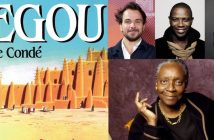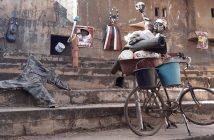Never in Arab cinema has a filmmaker so directly suggested that the spectator cease to be one in order to share the questionings of his approach to creation. Interrupting his narrative thrice, Bouzid films his leading actor’s revolt against the role he makes him play. It is so strong and unexpected that we believe it, Lotfi Abdelli’s performance (who was awarded « Best Actor » at the 2006 Carthage Film Festival for this film) largely contributing to the success of this making of graft in the film. When he asks the filmmaker what he’s letting himself in for, he becomes the mirror and voice of the questions of an artist who wants to share his doubts with the spectator as if it were necessary to negotiate rejection in advance. This shows how aware Bouzid is of tackling a taboo: in a Tunisian society completely in support of the Palestinian cause, a sort of masked sympathy shrouds the terrorist acts committed in the name of Islam. Why take terrorists as a subject? « Our duty is not to condemn but to save them by attacking the evil that affects them », answers Bouzid. Therefore, Making Of is the diagnosis of a spreading fundamentalist cancer and sets itself the task of revealing its methods and logic to better eradicate it from society.
But diagnosing is not enough to mobilize: the simple denunciation, or even the dissection of the logic at work do not, alone, triumph over behavior that draws on the emotional and the imagination. An artistic process is necessary, of the order of the catharsis evoked by the filmmaker when faced with his rebellious actor; transforming the emotions he feels into a reflection by baring them. Behind his actor hides a filmmaker afraid of not achieving his goal. Showing their confrontation in the film encourages the spectator to share this consciousness. But in the narrative, it was necessary to trivialize, to establish a sense of closeness, familiarity and humaneness. Stigmatizing would have been useless. This very detailed work would have been vain if the risk of choosing a likeable hero with whom we can identify was not taken. Bahta is a « brave, reckless » young man who « isn’t afraid of cops but is a bit lost », as describes one of the bearded fundamentalists who him as a potential human bomb. At the beginning of the film, he is more of nonconformist, break-dancing in a group, pinching his grandfather’s savings and not hesitating to humorously provoke the upright clients of a café by putting on his brother’s police uniform. When he is wanted by the police and his plans for a dance career abroad are compromised, the bearded fundamentalists offer him more than a hiding place and a job: an environment in which to think out his revolt against the historical humiliation suffered by the Arabs (the television images place the film in the midst of the Gulf War). Bahta is like Hachemi and Farfat in L’homme des cendres (Man of Ashes) – Bouzid’s first and beautiful film which this one answers like an echo- a human being « whose book of life is full of pain ». It is no longer a physical rape he endures but that of his imagination, which the Arab world suffers in global geopolitics. We know little of his wounds, apart from what his instinctive reactions seem to reveal. We only know they are inherited flaws. Like little Fôhda in Poupées d’argile (Clay Dolls) who destroys and reshapes the figurines she has modeled, he forges a man out of wire, a fragile being who lacks the points of reference needed to flesh him out.
« Thinking will lead to your downfall », his Islamic mentor tells him. Yet, it is what his close relations invite him to do, his girlfriend Souad whom he wants to see wear the veil and his weeping mother who « didn’t give him her milk so he could become an assassin ». « Don’t keep me from going to paradise! » answers a gradually brainwashed Bahta. The film was initially entitled Kamikaze. But Bouzid strives above all to avoid caricatures: he continually restores a distance, not through dialogue but through what he is best at, sensually intimate scenes that create doubt, a meaningful use of the elements so present in L’homme de cendres (Man of Ashes) and Poupées d’argile (Clay Dolls), starting with the fire that burns him, Bahta’s literally physical tension that draws a terrifying strength from conviction. When he watches the execution of a hostage on television, the screen mirrors the monster he could become. When Bouzid stops the shoot for the third time, he tells him how much interiorizing this character terrorizes him. The game of mirrors is complete: the filmmaker terrified by fundamentalism creates an actor terrified of having to let himself be crushed for the spectator to feel that terror. The stake is then to make terror a consciousness. And the film’s title takes on its full meaning: how much the fundamentalist vision of society shapes beings by playing on their weaknesses. It clarifies the incomprehensible: how young people can go and kill themselves in order to kill.
But another pitfall needed to be avoided: making Islam carry the can. We are familiar with Bouzid’s beliefs; he is not very keen on religion but respects tradition. Like for the rest, he strives to defuse the criticism he anticipates even before it is voiced. By tackling terrorism from a more intimate and cultural rather than detective aspect, he offers Arabs both a self-examination and proposes an inversion of racist Western clichés. That is why Bahta, far from despicable, had to retain his dignity. He is not a monster but the product of a bent that must be challenged head-on. While Hachemi and Farfat could not escape their position of molested children, Bahta burns himself while playing too much with fire, but his fate was not settled in advance. His wound and solitude are shared and if Bouzid’s pessimism or lucidity do not indicate that they can be remedied, at least hope prevents him from falling into the abyss of despair. That is, at any rate, what he is fighting for in making this strong and important film, for everyone to work for the human community. That is why he closes the film with a request to all those who will listen: « Be what you want to become, but be a homeland for us ».








